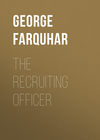Buch lesen: «The Constant Couple; Or, A Trip to the Jubilee: A Comedy, in Five Acts», Seite 4
Sir H. But no foul play with the lady, Vizard. [Exit.
Vizard. No fair play, I can assure you. [Exit.
SCENE III
The Street before Lady Lurewell's Lodgings
Clincher Senior, and Lurewell, coquetting in the Balcony. —Enter Standard
Colonel S. How weak is reason in disputes of love! I've heard her falsehood with such pressing proofs, that I no longer should distrust it. Yet still my love would baffle demonstration, and make impossibilities seem probable. [Looks up.] Ha! That fool too! What, stoop so low as that animal? – 'Tis true, women once fallen, like cowards in despair, will stick at nothing; there's no medium in their actions. They must be bright as angels, or black as fiends. But now for my revenge; I'll kick her cully before her face, call her whore, curse the whole sex, and leave her. [Goes in.
SCENE IV
A Dining Room
Enter Lady Lurewell and Clincher Senior
Lady L. Oh lord, sir, it is my husband! What will become of you?
Clinch. sen. Ah, your husband! Oh, I shall be murdered! What shall I do? Where shall I run? I'll creep into an oven – I'll climb up the chimney – I'll fly – I'll swim; – I wish to the lord I were at the Jubilee now.
Lady L. Can't you think of any thing, sir?
Clinch. sen. Think! not I; I never could think to any purpose in my life.
Lady L. What do you want, sir?
Enter Tom Errand
Tom. Madam, I am looking for Sir Harry Wildair; I saw him come in here this morning; and did imagine he might be here still, if he is not gone.
Lady L. A lucky hit! Here, friend, change clothes with this gentleman, quickly, strip.
Clinch. sen. Ay, ay, quickly strip; I'll give you half a crown to boot. Come here; so.
[They change Clothes.
Lady L. Now slip you [To Clinch Senior.] down stairs, and wait at the door till my husband be gone; and get you in there [To Tom Errand.] till I call you.
[Puts Errand in the next Room.
Enter Colonel Standard
Oh, sir, are you come? I wonder, sir, how you have the confidence to approach me, after so base a trick.
Colonel S. Oh, madam, all your artifices won't avail.
Lady L. Nay, sir, your artifices won't avail. I thought, sir, that I gave you caution enough against troubling me with Sir Harry Wildair's company, when I sent his letters back by you; yet you, forsooth, must tell him where I lodged, and expose me again to his impertinent courtship!
Colonel S. I expose you to his courtship!
Lady L. I'll lay my life you'll deny it now. Come, come, sir: a pitiful lie is as scandalous to a red coat, as an oath to a black.
Colonel S. You're all lies; first, your heart is false; your eyes are double; one look belies another; and then your tongue does contradict them all – Madam, I see a little devil just now hammering out a lie in your pericranium.
Lady L. As I hope for mercy, he's in the right on't. [Aside.
Colonel. S. Yes, yes, madam, I exposed you to the courtship of your fool Clincher, too; I hope your female wiles will impose that upon me – also —
Lady L. Clincher! Nay, now you're stark mad. I know no such person.
Colonel S. Oh, woman in perfection! not know him! 'Slife, madam, can my eyes, my piercing jealous eyes, be so deluded? Nay, madam, my nose could not mistake him; for I smelt the fop by his pulvilio, from the balcony down to the street.
Lady L. The balcony! ha! ha! ha! the balcony! I'll be hanged but he has mistaken Sir Harry Wildair's footman, with a new French livery, for a beau.
Colonel S. 'Sdeath, madam! what is there in me that looks like a cully? Did I not see him?
Lady L. No, no, you could not see him; you're dreaming, colonel. Will you believe your eyes, now that I have rubbed them open? – Here, you friend.
Enter Tom Errand, in Clincher Senior's Clothes
Colonel S. This is illusion all; my eyes conspire against themselves. Tis legerdemain.
Lady L. Legerdemain! Is that all your acknowledgment for your rude behaviour? – Oh, what a curse is it to love as I do! – Begone sir, [To Tom Errand.] to your impertinent master, and tell him I shall never be at leisure to receive any of his troublesome visits. – Send to me to know when I should be at home! – Begone, sir. [Exit Tom Errand.] I am sure he has made me an unfortunate woman. [Weeps.
Colonel S. Nay, then there is no certainty in nature; and truth is only falsehood well disguised.
Lady L. Sir, had not I owned my fond, foolish passion, I should not have been subject to such unjust suspicions: but it is an ungrateful return. [Weeping.
Colonel S. Now, where are all my firm resolves? I hope, madam, you'll pardon me, since jealousy, that magnified my suspicion, is as much the effect of love, as my easiness in being satisfied.
Lady L. Easiness in being satisfied! No, no, sir; cherish your suspicions, and feed upon your jealousy: 'tis fit meat for your squeamish stomach.
With me all women should this rule pursue:
Who think us false, should never find us true.
[Exit in a Rage.
Enter Clincher Senior in Tom Errand's Clothes
Clinch. sen. Well, intriguing is the prettiest, pleasantest thing for a man of my parts. – How shall we laugh at the husband, when he is gone? – How sillily he looks! He's in labour of horns already. – To make a colonel a cuckold! 'Twill be rare news for the alderman.
Colonel S. All this Sir Harry has occasioned; but he's brave, and will afford me a just revenge. – Oh, this is the porter I sent the challenge by – Well sir, have you found him?
Clinch. sen. What the devil does he mean now?
Colonel S. Have you given Sir Harry the note, fellow?
Clinch. sen. The note! what note?
Colonel S. The letter, blockhead, which I sent by you to Sir Harry Wildair; have you seen him?
Clinch. sen. Oh, lord, what shall I say now? Seen him? Yes, sir – no, sir. – I have, sir – I have not, sir.
Colonel S. The fellow's mad. Answer me directly, sirrah, or I'll break your head.
Clinch. sen. I know Sir Harry very well, sir; but as to the note, sir, I can't remember a word on't: truth is, I have a very bad memory.
Colonel S. Oh, sir, I'll quicken your memory. [Strikes him.
Clinch. sen. Zouns, sir, hold! – I did give him the note.
Colonel S. And what answer?
Clinch. sen. I mean, I did not give him the note.
Colonel S. What, d'ye banter, rascal? [Strikes him again.
Clinch. sen. Hold, sir, hold! He did send an answer.
Colonel S. What was't, villain?
Clinch. sen. Why, truly sir, I have forgot it: I told you that I had a very treacherous memory.
Colonel S. I'll engage you shall remember me this month, rascal.
[Beats him, and exit.
Enter Lurewell and Parly
Lady L. Oh, my poor gentleman! and was it beaten?
Clinch. sen. Yes, I have been beaten. But where's my clothes? my clothes?
Lady L. What, you won't leave me so soon, my dear, will ye?
Clinch. sen. Will ye! – If ever I peep into the colonel's tent again, may I be forced to run the gauntlet. But my clothes, madam.
Lady L. I sent the porter down stairs with them: did not you meet him?
Clinch. sen. Meet him? No, not I.
Parly. No! He went out at the back door, and is run clear away, I'm afraid.
Clinch. sen. Gone, say you, and with my clothes, my fine Jubilee clothes? – Oh, the rogue, the thief! – I'll have him hang'd for murder – But how shall I get home in this pickle?
Parly. I'm afraid, sir, the colonel will be back presently, for he dines at home.
Clinch. sen. Oh, then I must sneak off. Was ever such an unfortunate beau, To have his coat well thrash'd, and lose his coat also! [Exit.
Parly. Methinks, madam, the injuries you have suffered by men must be very great, to raise such heavy resentments against the whole sex; – and, I think, madam, your anger should be only confined to the author of your wrongs.
Lady L. The author! alas, I know him not.
Parly. Not know him? Tis odd, madam, that a man should rob you of that same jewel, and you not know him.
Lady L. Leave trifling: 'tis a subject that always sours my temper: but since, by thy faithful service, I have some reason to confide in your secresy, hear the strange relation. – Some twelve years ago, I lived at my father's house in Oxfordshire, blest with innocence, the ornamental, but weak guard of blooming beauty. Then it happened that three young gentlemen from the university coming into the country, and being benighted, and strangers, called at my father's: he was very glad of their company, and offered them the entertainment of his house.
Parly. Which they accepted, no doubt. Oh, these strolling collegians are never abroad, but upon some mischief.
Lady L. Two of them had a heavy, pedantic air: but the third —
Parly. Ah, the third, madam – the third of all things, they say, is very critical.
Lady L. He was – but in short, nature formed him for my undoing. His very looks were witty, and his expressive eyes spoke softer, prettier things, than words could frame.
Parly. There will be mischief by and by; I never heard a woman talk so much of eyes, but there were tears presently after.
Lady L. My father was so well pleased with his conversation, that he begged their company next day; they consented, and next night, Parly —
Parly. Ah, next night, madam – next night (I'm afraid) was a night indeed.
Lady L. He bribed my maid, with his gold, out of her modesty; and me, with his rhetoric, out of my honour. [Weeps.] He swore that he would come down from Oxford in a fortnight, and marry me.
Parly. The old bait, the old bait – I was cheated just so myself. [Aside.] But had not you the wit to know his name all this while?
Lady L. He told me that he was under an obligation to his companions, of concealing himself then, but, that he would write to me in two days, and let me know his name and quality. After all the binding oaths of constancy, I gave him a ring with this motto – "Love and Honour" – then we parted, and I never saw the dear deceiver more.
Parly. No, nor never will, I warrant you.
Lady L. I need not tell my griefs, which my father's death made a fair pretence for; he left me sole heiress and executrix to three thousand pounds a year: at last, my love for this single dissembler turned to a hatred of the whole sex; and, resolving to divert my melancholy, I went to travel. Here I will play my last scene; then retire to my country-house, and live solitary. We shall have that old impotent lecher, Smuggler, here to-night; I have a plot to swinge him, and his precise nephew, Vizard.
Parly. I think, madam, you manage every body that comes in your way.
Lady L. No, Parly; those men, whose pretensions I found just and honourable, I fairly dismissed, by letting them know my firm resolutions never to marry, But those villains, that would attempt my honour, I've seldom failed to manage.
Parly. What d'ye think of the colonel, madam? I suppose his designs are honourable.
Lady L. That man's a riddle; there's something of honour in his temper that pleases; I'm sure he loves me too, because he's soon jealous, and soon satisfied. – But hang him, I have teased him enough – Besides, Parly, I begin to be tired of my revenge: but this buss and guinea I must maul once more. I'll hansel his woman's clothes for him. Go, get me pen and ink; I must write to Vizard too.
Fortune, this once assist me as before:
Two such machines can never work in vain,
As thy propitious wheel, and my projecting brain.
[Exeunt.
ACT THE FOURTH
SCENE I
Covent Garden
Enter Sir H. Wildair and Colonel Standard, meeting
Colonel S. I thought, Sir Harry, to have met you ere this in a more convenient place; but since my wrongs were without ceremony, my revenge shall be so too. – Draw, sir.
Sir H. Draw, sir! What shall I draw?
Colonel S. Come, come, sir, I like your facetious humour well enough; it shows courage and unconcern. I know you brave, and therefore use you thus. Draw your sword.
Sir H. Nay, to oblige you, I will draw; but the devil take me if I fight. – Perhaps, colonel, this is the prettiest blade you have seen.
Colonel S. I doubt not but the arm is good; and therefore think both worth my resentment. Come, sir.
Sir H. But, pr'ythee, colonel, dost think that I am such a madman, as to send my soul to the devil and body to the worms – upon every fool's errand? [Aside.
Colonel S. I hope you're no coward, sir.
Sir H. Coward, sir! I have eight thousand pounds a year, sir.
Colonel S. You fought in the army, to my knowledge.
Sir H. Ay, for the same reason that I wore a red coat; because 'twas fashionable.
Colonel S. Sir, you fought a French count in Paris.
Sir H. True, sir, he was a beau, like myself. Now you're a soldier, colonel, and fighting's your trade; and I think it downright madness to contend with any man in his profession.
Colonel S. Come, sir, no more dallying; I shall take very unseemly methods, if you don't show yourself a gentleman.
Sir H. A gentleman! Why, there again, now. A gentleman! I tell you once more, colonel, that I am a baronet, and have eight thousand pounds a year. I can dance, sing, ride, fence, understand the languages – Now I can't conceive how running you through the body should contribute one jot more to my gentility. But pray, colonel, I had forgot to ask you, what's the quarrel?
Colonel S. A woman, sir.
Sir H. Then I put up my sword. Take her.
Colonel S. Sir, my honour's concerned.
Sir H. Nay, if your honour be concerned with a woman, get it out of her hands as soon as you can. – An honourable lover is the greatest slave in nature: some will say, the greatest fool. Come, come, colonel, this is something about the Lady Lurewell, I warrant; I can give you satisfaction in that affair.
Colonel S. Do so then immediately.
Sir H. Put up your sword first; you know I dare fight, but I had much rather make you a friend than an enemy. I can assure you this lady will prove too hard for one of your temper. You have too much honour, too much in conscience, to be a favourite with the ladies.
Colonel S. I'm assured, sir, she never gave you any encouragement.
Sir H. A man can never hear reason with his sword in his hand. Sheath your weapon; and then, if I don't satisfy you, sheath it in my body.
Colonel S. Give me but demonstration of her granting you any favour, and it is enough.
Sir H. Will you take my word?
Colonel S. Pardon me, sir, I cannot.
Sir H. Will you believe your own eyes?
Colonel S. 'Tis ten to one whether I shall or no; they have deceived me already.
Sir H. That's hard – but some means I shall devise for your satisfaction – [Noise.] – We must fly this place, else that cluster of mob will overwhelm us. [Exeunt.
Enter Mob, Tom Errand's Wife hurrying in Clincher Senior in Errand's Clothes
Wife. Oh! the villain, the rogue, he has murdered my husband. Ah, my poor Timothy! [Crying.
Clinch. sen. Dem your Timothy! – your husband has murdered me, woman; for he has carried away my fine Jubilee clothes.
Mob. Away with him – away with him to the Thames.
Clinch. sen. Oh, if I had but my swimming girdle now!
Enter Constable
Const. Hold, neighbours, I command the peace.
Wife. Oh, Mr. Constable, here's a rogue that has murdered my husband, and robbed him of his clothes.
Const. Murder and robbery! – Then he must be a gentleman. – Hands off there; he must not be abused. – Give an account of yourself. Are you a gentleman?
Clinch. sen. No, sir, I'm a beau.
Const. A beau – Then you have killed nobody, I'm persuaded. How came you by these clothes, sir?
Clinch. sen. You must know, sir, that walking along, sir, I don't know how, sir, I can't tell where, sir, – and so the porter and I changed clothes, sir.
Const. Very well. The man speaks reason, and like a gentleman.
Wife. But pray, Mr. Constable, ask him how he changed clothes with him.
Const. Silence, woman, and don't disturb the court. Well, sir, how did you change clothes?
Clinch. sen. Why, sir, he pulled off my coat, and I drew off his: so I put on his coat, and he put on mine.
Const. Why, neighbour, I don't find that he's guilty: search him – and if he carries no arms about him, we'll let him go.
[They search his Pockets, and pull out his Pistols.
Clinch. sen. Oh, gemini! My Jubilee pistols!
Const. What, a case of pistols! Then the case is plain. Speak, what are you, sir? Whence came you, and whither go you?
Clinch. sen. Sir, I came from Russel Street, and am going to the Jubilee.
Wife. You shall go the gallows, you rogue.
Const. Away with him, away with him to Newgate, straight.
Clinch. sen. I shall go to the Jubilee now, indeed.
Enter Sir. H. Wildair and Colonel Standard
Sir H. In short, colonel, 'tis all nonsense – fight for a woman! Hard by is the lady's house, if you please, we'll wait on her together: you shall draw your sword – I'll draw my snuff-box: you shall produce your wounds received in war – I'll relate mine by Cupid's dart: you shall swear – I'll sigh: you shall sa, sa, and I'll coupée; and if she flies not to my arms, like a hawk to its perch, my dancing-master deserves to be damned.
Colonel S. With the generality of women, I grant you, these arts may prevail.
Sir H. Generality of women! Why there again, you're out. They're all alike, sir: I never heard of any one that was particular, but one.
Colonel S. Who was she, pray?
Sir H. Penelope, I think she's called, and that's a poetical story too. When will you find a poet in our age make a woman so chaste?
Colonel S. Well, Sir Harry, your facetious humour can disguise falsehood, and make calumny pass for satire; but you have promised me ocular demonstration that she favours you: make that good, and I shall then maintain faith and female to be as inconsistent as truth and falsehood.
Sir H. But will you be convinced, if our plot succeeds.
Colonel S. I rely on your word and honour, Sir Harry.
Sir H. Then meet me half an hour hence at the Shakspeare; you must oblige me by taking a hearty glass with me toward the fitting me out for a certain project, which this night I undertake.
Colonel S. I guess, by the preparation, that woman's the design.
Sir H. Yes, 'faith. – I am taken dangerously ill with two foolish maladies, modesty and love: the first I'll cure with Burgundy, and my love by a night's lodging with the damsel. A sure remedy. Probatum est.
Colonel S. I'll certainly meet you, sir. [Exeunt severally.
Enter Clincher Junior and Dicky
Clinch. jun. Ah, Dick, this London is a sad place, a sad vicious place: I wish that I were in the country again. And this brother of mine – I'm sorry he's so great a rake: I had rather see him dead than see him thus.
Dicky. Ay, sir, he'll spend his whole estate at this same Jubilee. Who d'ye think lives at this same Jubilee?
Clinch. jun. Who, pray?
Dicky. The Pope.
Clinch. jun. The devil he does! My brother go to the place where the Pope dwells! He's bewitched, sure!
Enter Tom Errand, in Clincher Senior's Clothes
Dicky. Indeed, I believe he is, for he's strangely altered.
Clinch. jun. Altered! Why, he looks like a Jesuit already.
Tom. This lace will sell. What a blockhead was the fellow to trust me with his coat! If I can get cross the garden, down to the water-side, I am pretty secure.
Clinch. jun. Brother? – Alaw! Oh, gemini! Are you my brother?
Dicky. I seize you in the kings name, sir.
Tom. Oh, lord! should this prove some parliament man now!
Clinch. jun. Speak, you rogue, what are you?
Tom. A poor porter, and going of an errand.
Dicky. What errand? Speak, you rogue.
Tom. A fool's errand, I'm afraid.
Clinch. jun. Who sent you?
Tom. A beau, sir.
Dicky. No, no; the rogue has murdered your brother, and stripped him of his clothes.
Clinch. jun. Murdered my brother! Oh, crimini! Oh, my poor Jubilee brother! Stay, by Jupiter Ammon, I'm heir though. Speak, sir, have you killed him? Confess that you have killed him, and I'll give you half a crown.
Tom. Who I, sir? Alack-a-day, sir, I never killed any man, but a carrier's horse once.
Clinch. jun. Then you shall certainly be hanged; but confess that you killed him, and we'll let you go.
Tom. Telling the truth hangs a man, but confessing a lie can do no harm: besides, if the worst come to the worst, I can but deny it again. – Well, sir, since I must tell you, I did kill him.
Clinch. jun. Here's your money, sir. – But are you sure you killed him dead?
Tom. Sir, I'll swear it before any judge in England.
Dicky. But are you sure that he's dead in law?
Tom. Dead in law! I can't tell whether he be dead in law. But he's as dead as a door nail; for I gave him seven knocks on the head with a hammer.
Dicky. Then you have the estate by statute. Any man that's knocked on the head is dead in law.
Clinch. jun. But are you sure he was compos mentis when he was killed?
Tom. I suppose he was, sir; for he told me nothing to the contrary afterwards.
Clinch. jun. Hey! Then I go to the Jubilee. – Strip, sir, strip. By Jupiter Ammon, strip.
Dicky. Ah! don't swear, sir.
[Puts on his Brother's Clothes.
Clinch. jun. Swear, sir! Zoons, ha'n't I got the estate, sir? Come, sir, now I'm in mourning for my brother.
Tom. I hope you'll let me go now, sir.
Clinch. jun. Yes, yes, sir; but you must do the favour to swear positively before a magistrate, that you killed him dead, that I may enter upon the estate without any trouble. By Jupiter Ammon, all my religion's gone, since I put on these fine clothes. – Hey, call me a coach somebody.
Tom. Ay, master, let me go, and I'll call one immediately.


















